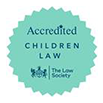Email: This email address is being protected from spambots. You need JavaScript enabled to view it.
Mitchell qualified as a solicitor in 1995.
In addition to his work at ScoMo, Mitchell has links with Queen Mary, University of London. He has been involved with the teaching of the 'International Law on the Rights of the Child' LLM course for over a decade.
Practice areas:
Experience:
Mitchell Woolf specialises in human rights law and, in particular, the rights of the child and people with disabilities. He brings community care and public law challenges against state bodies such as local authorities, health trusts and government departments. He brings challenges on behalf of vulnerable children and adults, including children with disabilities, children in care and in detention and adults with disabilities/learning disabilities. He also challenges breaches of the Human Rights Act.
Mitchell has provided advice to a number of NGOs and charities and given training in the UK and abroad to academics, practitioners, NGOs, the police and the judiciary.
Memberships:
- Rights of the Child UK Coalition (ROCK)
Notable cases:
R (Takoushis) v HM Coroner for Inner North London, & others [2005] EWCA Civ 1440
Where a death occurred as a result of alleged negligence under the NHS, the state must put in place an investigation into a possible systemic failure, which involves a full and fair inquiry into the circumstances of death.
R (P) v Newham LBC [2004] EWHC 2010 (Admin)
The Court ordered the Council to produce a pathway plan in accordance with the statutory duties that exist for care leavers. This was the first case brought in relation to the Children (Leaving Care) Act 2000
R (Deeming) v Birmingham City Council [2006] EWHC 3719 (Admin)
The lack of specificity in a pathway plan for a care leaver was found to be unlawful. The Court recognised, in particular, the need for a proper assessment of the care leaver's financial needs and the importance of contingency planning
S, C & D v Secretary of State for the Home Department [2007] EWHC 1654 (Admin)
A decision to detain a mother and her two young children after the refusal of her asylum claim under the fast-track procedure was unlawful and an infringement of Art 5 of the ECHR because there were no strong grounds for believing that she would not comply with conditions of temporary admission or release. There had also been a breach of one of the children's right to physical integrity under Art. 8 of the ECHR as his development of rickets and anaemia whilst in detention was reasonably foreseeable and avoidable.
R (JL) v Islington LBC [2009] EWHC 458 (Admin)
The Council's new eligibility criteria which resulted in a massive cut to a child with autism's short break care package was held to be unlawful. Most significantly it failed to recognise that JL had a right to services under section 2 of the Chronically Sick and Disabled Persons Act 1970
R (KM) v Cambridgeshire County Council [2012] UKSC 23
The Supreme Court held that a Resource Allocation System may be used as a 'starting point' in the process of working out how much funding a disabled person requires but does not dispense with the legal duty to ensure that all 'eligible' assessed needs are met.
Waxman v Crown Prosecution Service [2012] EWHC 133 (Admin)
Using the Human Rights Act 1998 in order to protect the rights of victims of crime. A stalker did not have the right to use the Courts for the purpose of continuing to harass his victim when he was the subject of a Restraining Order. The CPS was ordered to pay damages under Art 8 of the ECHR as a result of its failure to take proper measures to protect the victim from psychological harm caused by the further acts of harassment.
Cameron Mathieson (deceased) by his father Craig Mathieson v Secretary of State for Work and Pensions (heard in the Supreme Court on 26th March 2015)
Judgement awaited in challenge to the lawfulness of regulations which stop payment of DLA to sick and disabled children after they have been in hospital for 84 days. It is argued that this amounts to a breach of Art 14 of the ECHR (when read with Art 1 Protocol 1 and/or Art 8 ECHR) and fails to comply with the obligation to ensure that the bestinterests of the child are a primary consideration (Art 3(1) of the UN Convention on the Rights of the Child 1989).
Authored Titles
- Challenging Impunity for Torture, A manual for bringing criminal and civil proceedings for torture committed abroad (REDRESS, 2000)
- Human Rights Act Toolkit (with J. Watson, LAG, 2003) (2nd Edition 2008)
Other publications include
- 'Why Incorporate' Making Rights a Reality for Every Child (Co-author with Children's Rights Alliance for England, Save the Children and UNICEF UK) (2012)
- 'Coming of Age? The Principle of the Best Interests of the Child' (2003) EHRLR 207
- 'Seen but Still not Heard: The Right of the Child to Participation' in Child Participation: Challenges of Empowerment 9 World Vision Spring, 2000








